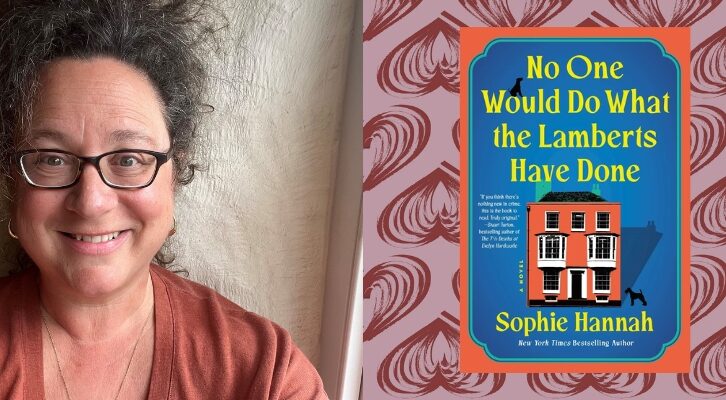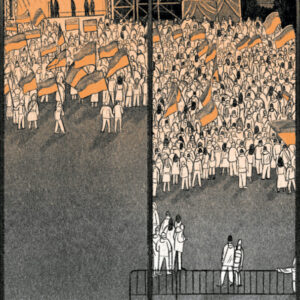
Can Your Best Friends Be Books?
In Praise of the Solitary, the Bookish, the Diehard Readers
Recently, reading a Mary Oliver essay collection, I stumbled across a piece called “My Friend Walt Whitman.” In it, she admits she had merely a few friends as a child in 1950s Ohio, and they were all dead. They were her favorite books.
Defiantly, she insists that, while inanimate, they were true friends. “Powerful and amazing,” “avuncular,” “full of metaphysical curiosity,” and “oracular tenderness.” Like the comic strip Calvin’s stuffed animal Hobbes, they accompanied her on adventures into the wilderness, their heavy weight in her backpack the reassuring equivalent of a human child’s hand in her own, encouraging her to go a little bit further. She was not alone.
They were not only companions, but mirrors. Or more than mirrors—they were seer stones. They allowed her to glimpse in herself qualities she didn’t even know she had yet: courage, wisdom, heart, the capacity to make and hold opinions based on a perception of the truth. That revelation came through the process of witnessing herself described, breathtakingly, in the texts. In Whitman’s practice of “loafing,” that miraculously self-confident laziness that encompassed pleasure and curiosity and wonder, she recognized her own strange style of being in the world, and saw that it could be so good, so lovely, that it was worth immortalizing in words. It also came through the joy of reading itself. She felt a sense of triumph interpreting complicated words, and not only interpreting them but seeing them, in her mind, expand into a whole imaginary world, one she could enter and survive.
Oliver also confesses that books were her friends because she felt frail in the real world. Her father was abusive. Her beloved uncle killed himself. “The boy from Romania moved away.” Books promised what people in her world couldn’t seem to: they would always be there.
In light of this confession, the breathless, anthropomorphic adjectives she piles up to describe her book-friends ring like a defense—the bricks of a sad, shy child’s makeshift fortress, arrayed against the potential accusation that books can’t be real friends, and that relying on them as such indicates a deficit of social skills, a failure’s inclination to escape into fantasy, or just too sensitive a soul.
*
I, too, had book friends as a child, and at a time when making real friends could feel like too much to bear. When I was 12, I befriended a book called Is Paris Burning? at summer camp. The camp was an “outdoor camp,” full of blonde, suntanned children whose feet were so nimble with a soccer ball it seemed as though they’d been born with it. The word “nimble” didn’t apply to me. I had asthma. I wore giant glasses with pink plastic frames. I felt anxious often. I tripped on the sidewalk so many times I earned the nickname “Eve Falls.”
A month or two earlier, my Dad had bought me Is Paris Burning? as a nod to our shared fascination with the Second World War. I can still remember the tear on the shiny black cover, evidence it had been previously loved. The hand-cut pages. The smell, that delicious smell, part paper, part hardwood, that only old books seem to have.
To escape the soccer kids, I sat at the front of the bus—that dorky jump seat reserved for kids who have to form a desperate, sad alliance with the driver over children their own age. I put my knees up against the pleather back of the driver’s seat so I was in the fetal position, and curled myself around the book as if it was my placenta. When I got off the bus, I relished, like Mary Oliver, the weight the hardcover made in my backpack. It felt like the bulk of a friend, one of the hefty soccer players, but a kindly one, accepting, who would come always to my defense.
It made me, however, the butt of the real soccer players’ jokes. The next year, at Hebrew school, I so hated the cliquey, enforced socialization over soft drinks between classes that I hid for the whole 20 minutes with a book in a bathroom stall. When I confessed this to my father, he was so worried about my development that he showed up during one of these breaks to keep me company, introducing himself to other kids and asking them to hang out with me. You can imagine what this did for my cool factor.
*
We say we want kids to read more, yet we also harbor a deep suspicion of the too-bookish kid. Fran Lebowitz, the writer, tells of barricading herself in a bedroom as a child to read. Her mother would bust open the door and shout, “Are you reading again?”
To the extent that we think childhood has any purpose anymore other than to meticulously prepare children for applications to Princeton, we think it’s about socialization, about helping them learn to function in a group of kids so they can have friends and get married as adults and not live in cabins alone somewhere, building strange machines and masturbating to Lord of the Rings. It feels as though we’ve become more content seeing kids blanked out in front of the TV than with their noses buried in a book. Maybe this is because a kid’s relationship with TV is less dreamy—the TV projects, the kid receives—and thus provokes less worry that this child is developing a secret, un-monitorable, fantasy-based inner life and may end up a school shooter. Kids ferret books away to read in secret, foiling their parents’ plans to keep an eye on them and monitor every twitch of their development. And multiple children can be parked in front of a TV at once, allowing adults to lie to themselves that it’s really a “play date.”
We associate an obsession with books, too, with loneliness, and perhaps a willful failure to learn how to play nice with other people. With books, kids don’t need to deal with the inconsistency that comes with the needs and confusions embodied by another actual human being. A child doesn’t have to care about a book or love it back; even a Chia Pet seems to require more active love than a book. In fact, the books I loved most as a child were also the ones I dared most joyously to damage. I dog-eared every other page in Is Paris Burning. The Giver I dropped many times in the bathtub, where I often hid to drown out the noise of my parents’ arguing, and to feel the touch of an unconditionally caressing being—the warm water—all over my body in a home where physical touch was rare, and fraught. Eventually, the poor, soaked Giver started to physically dissolve.
Unearthing old copies of Calvin and Hobbes in my childhood bedroom last January, I discovered that I had practiced cursive handwriting in orange marker not only on the flyleaf but on top of the cartoons, rendering the books, now, practically unreadable. Kids project themselves onto books, we could say, creating a fantasy connection, one with a “being” who is mute and cannot argue back, getting what they want out of them when they need it and blithely discarding them when they don’t, reassured by the fact that they are always the same, always there, and cannot hurt them with their own expectations or their pain. All of which sounds like a fair description of a really bad adult relationship.
And yet I reckon this rests on a terrible misunderstanding of both friendship and childhood. Mary Oliver needn’t have been defensive. Books can teach kids something essential about how to be a friend—and teach us adults, too.
*
What is a friend? It seems that incredibly little is written about friendship compared to romantic love. Friendship was once a topic that engaged the great philosophers, from Aristotle to C.S. Lewis. But it’s a mystery to us. The Los Angeles Public Library’s purported list of recommendations for books on “friendship” consists of nine books on romantic love and only two on actual friendship.
To the extent that we do ponder it, we often think about it in economic terms. We say we “invest in” our friendships. We assume friendships take work and depend on, or are even essentially the sum total of, tangible deeds—the quantity of phone calls, Facebook likes, or coffee dates. We speak of “friendship maintenance” like the way we maintain a car. I actually used to put “friendship maintenance” on my daily to-do list along with my laundry and bills, reminding myself to call this friend, to surprise another one with a “random” Kindle gift. I had a therapist once who judged the quality of my friends with a single question: “Do they answer your WhatsApps immediately?” It was a proxy for care in our age, which is obsessed with anxiety about isolation. Our friendships are like the ledgers in checkbooks: what we put in equals what we get out.
WikiHow has a popular page called “How to Maintain a Friendship: 8 Steps.” Step one: “Keep your friendship rewarding.” In this model, friendship consists of a) doing things together, b) fastidiously maintaining maximum contact, and c) making sure your friend is doing an equal number of things for you, too. “Do nice things like getting their favorite candy,” it advises. “Take the time to really hear what they’re saying, and offer advice only if they ask for it… Visit whenever you can… Schedule video chats online… Try out Zumba together. It will bring you closer.” In contemporary academic friendship studies, the keywords are “reciprocity” and “self-disclosure.”
We treat friends like money in another way: the more we have, the better. We speak of “social capital,” and never stop to consider how creepy this phrase is. And, like capital, we expect friendship to be relentlessly “in the black,” relentlessly positive and “supportive,” relentlessly dedicated to the effort of making our lives look more fabulous. Almost desperately, we practice constant “self-disclosure,” but we practice little actual vulnerability. Recently, two Facebook friends of mine posted remarkably candid mini-essays, one lamenting the breakdown of his marriage and another revealing his inner torment about his racism. The posts were so real; they made me feel closer to both people. Then, within hours, and after receiving snarky comments from acquaintances, both scrubbed them from their feeds. It’s hard to be vulnerable with anyone but a true friend. But we no longer differentiate between friends and “friends.” Once, peeking at my Facebook profile, my father asked, “You have 2,000 friends?” Only much later did it occur to me that his tone was sarcastic.
For Aristotle, a highly fussed-over, meticulously crafted, and obsessively reciprocal friendship based on jointly performing common interests was one of the baser forms of friendship. He identified three: the friendship of utility, the friendship of pleasure, and the friendship of virtue.
The friendship of utility is the product of what we would now call networking: you scratch my back and I’ll scratch yours. The friendship of pleasure is what WikiHow was going for: you both enjoy Zumba, so you make standing dates to do it. The friendship of virtue, though, is something completely different, something far beyond mutual care and sharing common interests, something for which we barely have the language. Aristotle ranked it as the highest ethical good, above both honor and justice. This kind of friendship, he claimed, “seems to hold cities together.”
What is the friendship of virtue? It does not seek flattery; in fact, it condemns it. It loves for a person’s own sake, not for any perceived utility or particular reciprocity. The virtuous friendship can withstand criticism and even some damage. Its bond comes from a mysterious thing Aristotle called eudaimonia, or roughly, a shared sense of “what it means to flourish as a human.” Elsewhere, he called this quality “singleness of mind.”
Though we wouldn’t know how to begin to write up a WikiHow list for how to create eudaimonia, many of us have encountered it. It’s that amazing, eerie sense that someone else is just somehow “on your wavelength.” They instantly “get you,” even if you just met; you could talk all night. Mary Oliver felt eudaimonia with Walt Whitman. C.S. Lewis also wrote wonderfully on this experience: “Friendship… is born of the moment when one man says to another, ‘What! You too? I thought that no one but myself…'”
As such, it is the ultimate, perhaps the only, bulwark against loneliness. It gives us the mystical and gratifying experience that our inner selves, which we all secretly fear are shamefully weird, are seen and even partially possessed by another. Our souls have a true sibling. How astonishing!
When that shared eudaimonia is felt and embraced, a lot can happen from which a friendship can recover. Friends can dare to critique each other, out of concern and love. (Montaigne said a true friendship must contain an element of “admonishment”; eudaimonia is what makes us confident that the friend wants to help us, not to damage us.) Friends can hurt each other by accident; again, eudaimonia is what reassures that their motives are pure. Friends can talk over great distances, or even never meet in person. And virtuous friends can accept space in their friendship. In fact, one of the most profound experiences in deep friendship is to be separated from a friend, and then, upon the return, find that it’s as if you never parted, or crazily, that you’re even closer.
Yet the whole way we think about human connection now militates against this experience of friendship. We don’t like things we can’t understand, define, and control. We don’t like things we can’t assure ourselves we can master in eight steps. We have no faith in the natural these days. But virtuous friendship depends on something we absolutely cannot manufacture or manage.
No matter how many self-help books we read, deep in our hearts we know we are beings more fallible than capable. We have moods, we forget things, we fail our duties. We know one day we’ll fail a relationship that depends on a tangible exchange of goods. We’re not fast-food companies, with quality-control departments to ensure that the love we have to give always reliably looks and tastes the same. When we imagine human love as a product on the marketplace, we become incredibly anxious; we fear we will slip up or change and lose what we love. But we can’t control other people like we balance our checkbooks. Aristotle disaggregated friendship from justice because there is no justice in friendship; it is beyond justice.
It interests me that so much adult friendship now takes place in the context of book clubs. I suspect that this is because the book is the most vulnerable and real entity in the room. Eudaimonia demands a certain confidence, a willingness to put out there what you really, secretively, tentatively believe, and let it hang there, in the hopes it triggers something in the listener. It also demands a particularly humble and patient form of curiosity. It demands stillness, the willingness to watch quietly while the character of a person you are beginning to love unfurls before you like a fern in the spring, slowly.
The very unchangeability of a book makes it a testament to imperfection, a profile in courage. Once it is published, parts of its contents that reviewers or readers complain about cannot be “taken down,” scrubbed from the record. Its permanence invites us to slowness, to contemplation of its character without the worry that it will withdraw itself in reaction to our critique or ambivalence. I think our interest in communing with people in book clubs represents our recognition that there is something in books that might be missing from our friendships.
*
What does this have to do with children? These days we imagine children in two simultaneous and conflicting ways: as miniature adults, in ferocious prep for a competitive and difficult world, and as fonts of untainted purity, windows into the most delightful aspects of the human spirit before they get tarnished by society. We got the latter idea from Rousseau.
But kids are neither miniature adults nor saints. We idealize a child’s love, but it doesn’t have certain qualities necessary to mature love. In fact, it suffers from adult love’s worst pitfalls: inconsistency and cruelty. My best childhood friend Nicky romped with me in woods and swam with me in swimming pools; I believed we loved each other. Then, one day, he called me up and haughtily told me he would never play with me again. “I’m a Ghostbuster now,” he said, “and Ghostbusters don’t play with girls.” Kids are mercurial, prideful, hopelessly inconsiderate, and painfully status-conscious. Basically, they’re frequently little shits.
And what prepares them for adulthood is not necessarily a dumbed-down version of adulthood, just like what prepares a fetus for the world isn’t air and competition, but something different, a sweet and quiet place where every need of theirs is met without the asking, a place that nurtures both the strongest and the frailest parts of them alike. In our alienation from nature, I think we have forgotten that things emerge out of other things that are not their mere parallel. The hard seed makes the soft plant, the soft plant makes the hard seed.
*
In books, more than in other children, kids can glimpse their first inkling of eudaimonia. Like a womb for friendship, a book friend nurtures the qualities necessary to deep friendship without exposing the vulnerable child to the difficulties inherent in loving another human being. In loving a book, a kid can practice eudaimonia in a safe environment. He can get a feel for how it feels to love without fear, and to feel his spirit recognized. A book will not tell him it has become a Ghostbuster and snap shut its covers. Its love is unconditional—yet also finite. It abides our infinite curiosity while teaching us that there is only so much a beloved can give of himself, can reveal of himself, and that these limits must satisfy us.
A book does not make a child work for its affection. It reveals one of the sweetest elements of eudaimonia: a sense of effortlessness. What would happen if we told kids the most joyful relationships could, at least at times, feel effortless, instead of instructing them that relationships are just another realm in which they have to work hard and achieve? A book’s limitless patience sets a child free to discover his own interior rhythms, what attracts and bores him and what he really loves, liberated from the pressure to create a persona that he believes will be lovable.
The very fact that a book-as-friend can’t talk back, and thus stimulates the imagination to fill in holes, teaches the lesson that love must not only accommodate unknowable mystery, but actually thrives on it. It teaches the child that love can bear some pain, some dog-ears and water damage, even some neglect, and survive. At the same time, it teaches the worth of fealty. One of the best experiences with a book-friend, as a child, is forgetting the book for a few months and coming back to it to find it both familiar and wonderfully fresh and new.
Finally, it teaches the depth with which it is possible to be curious about a stranger, and how much that curiosity can add to life. For with a book-friend, that “singleness of mind” is magically achieved with an author or a character very different from oneself. The author is older, in the least. But maybe the author is also from a different century, or has a different race, gender, or sexuality. The story is set in space, or on the prairie, but usually far from Fieldston or Chicago’s South Side. Books teach a child to reach towards a friend with the greatest capacity of their imagination, and to see their soul reflected in a stranger’s, glimpsing the greatest miracle in adult life: the way two who are divided by the very fact of their apparently impermeable skins can find a bridge to each other, see each other, and fuse their dreams. It is that capacity to see our own dreams reflected in others that holds the cities together, as Aristotle wrote. And a book does this all with a gentleness and acceptance and patience impossible for another human being to extend, not to mention another emotionally turbulent child.
Recently, I asked a group of acquaintances whether they had ever considered a book a friend. The ones who answered yes were not loners: just the opposite. Will, who befriended Starship Troopers, is studying to be a doctor; Meir Simchah, who befriended the Torah, has five beloved children and is one of the friendliest people I know. So maybe we don’t need to worry about the bookish children. They are, in fact, in apprenticeship to be people people, exceptional appreciators of their friends for their own qualities, and secure in the knowledge they need be no more than who they are to find a friend.
These book-befrienders also share a distinctive experience: At some point, as adults, many try to buy the book again. Getting a fresh copy is invariably disappointing. True friends are irreplaceable: we love them for themselves and for the way they carry our distinctive histories. They aren’t just a bouquet of traits we want more of in our lives, as in, “I’m feeling a lack of enthusiasm, so I’m going to inject some wacky Dan into my life today.” We book lovers found that we actually missed the books themselves: the ones we had touched with our hands, the ones we had doodled in, the ones we had put up as shields against hard lessons of the world.
Eve Fairbanks
Eve Fairbanks writes about change: in cities, countries, landscapes, morals, values, and our ideas of ourselves. A former political writer for The New Republic, her essays and reportage have been published in The Washington Post, The New York Times, and The Guardian, among other outlets. Born in Virginia, she now lives in Johannesburg, South Africa.



















